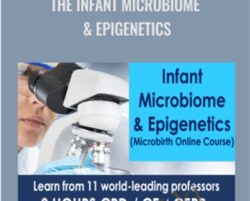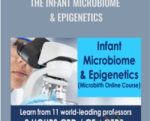THE INFANT MICROBIOME & EPIGENETICSMICROBIRTH ONLINE COURSE. Learn from leading professors. 9 HOURS CPD / CE / CERPs approved by IBLCE, ACNM, ACM, MEAC, NMC, LAMAZE, ICEA, CAPPA, DONATHE INFANT MICROBIOME & EPIGENETICS (MICROBIRTH ONLINE COURSE)USD $80 / AUD $118 / CAD $107 / NZD $125 /GBP £66 / EURO 73 / ZAR 1223 + local taxesThis is a one-time purchase. There are no recurring fees.There are no TIME LIMITS to complete the course.9 HOURS CPD / CE / / CNEs / CERPs can be claimed when needed for re-certification.The usual price for this course is USD $247 – but we want to make this critical information affordable by all, so we have discounted the price to USD $80 price for a limited time only.Group BookingsFor groups, the person who makes the purchase will be emailed access codes to distribute to all members of the group. Each group member will use the access code to create their own account. CPD/CEU credits are claimed by each individual upon completion of the course.For larger groups of more than 10 people, including schools, colleges, universities or organisations, please CONTACT US for a bespoke quote.Groups of 10: USD $400 + local taxes THE INFANT MICROBIOME & EPIGENETICS(MICROBIRTH ONLINE COURSE 9 x 60 MINS)For health professionalsHelping YOU feel more confident about the infant microbiome.Helping YOU support parents with full informed choice.Helping YOU understand the science that strongly supports:vaginal birthimmediate skin-to-skin contactexclusive breastfeedingFor the optimal development of the infant immune system for best possible lifelong healthEvidence-based, easy-to-understand and go-at-your-own paceNo deadlines to complete course so you can take days, weeks, months or years!Learn from 11 leading professors and 2 lactation expertsApproved for 9 CPD HOURS / CE / CNE / CERPs creditsDownloadable handouts & Certificate of CompletionCovers the developing infant microbiome and epigenetics during conception, pregnancy, vaginal birth, C-section, breastfeeding & formula feeding The Infant Microbiome and Epigenetics(Microbirth Online Course 9x 60 Mins)Featuring 11 leading professors & 2 lactation expertsMARTIN BLASER, Muriel G. and George W. Singer Professor of Translational Medicine, Director Human Microbiome Program, New York University Langone Medical Center and author Missing MicrobesMARIA GLORIA DOMINGUEZ-BELLO, Henry Rutgers Professor of Microbiome and Health, Department of Biochemistry and Microbiology, and of Anthropology, Rutgers, The State University of New JerseyRODNEY DIETERT, Emeritus Professor of Immunotoxicology, Cornell University and author The Human SuperorganismGREGOR REID, Professor of Surgery, Microbiology & Immunology, University of Western Ontario, Director of the Canadian Centre for Human Microbiome and Probiotic Research, Lawson Health Research InstituteANITA KOZYRSKYJ, Professor, Department of Pediatrics, University of AlbertaJACQUELYN TAYLOR, Vernice D Ferguson Professor in Heath Equity, New York UniversitySUE CARTER, Executive Director of the Kinsey Institute and Rudy Professor of Biology at Indiana UniversityALEECA BELL, Associate Professor at the University of Illinois at ChicagoLESLEY PAGE, Visiting Professor of Midwifery, King’s College LondonHANNAH DAHLEN, Professor of Midwifery, Western Sydney UniversityPHILIP STEER, Emeritus Professor of Obstetrics, Imperial College LondonMAUREEN MINCHIN, Author of Milk Matters: Infant Feeding and Immune DisorderLAUREL WILSON, IBCLC, Author, International Breastfeeding Speaker Approved for 9 Continuing Education credits:9 HOURS CPD / CE / CERPs / CNEs which can be used for certification / recertification if you are a midwife (LM, CPM, CM, CNM), lactation consultant, nurse, doula, childbirth educator, breastfeeding professional or other health professional.The following CE credits are accepted by midwifery, nursing, doula, childbirth education orgnanizations including: IBLCE, AMCB for CMP, ACM, CCI, ICEA, DONA International, CAPPA and as CE Credits by Lamaze Certified Childbirth Educators, and as nursing CNE credits by many state boards.9 CONTACT HOURS – American College of Nurse-Midwives (ACNM) #2019/019 CPD HOURS – Australian College of Midwives (ACM)9 HOURS / 0.9 CEUs – Midwifery Educational Accreditation Council (MEAC) Program No #M1819-62-0621DE9 CERPs (4 L-CERPs & 5 R-CERPs) – International Board of Lactation Consultant Examiners (IBLCE) CERPS Registry No. 319021K9.0 LAMAZE CONTACT HOURS – Lamaze International LIN 18-20. These hours may be applied towards recertification as an LCCE educator under the learning competencies 1, 3, 5 and 6.9.0 CONTACT HOURS – accepted by International Childbirth Education Association (ICEA) LIN 18-209 HOURS of continuing education approved by the Midwifery Council (for midwives of New Zealand). This course has been approved as continuing midwifery education by the Midwifery Council (New Zealand) for 9 hours. Alto Films Ltd Approval Number: 2018CME038EThis course can be used as 9 HOURS CPD for revalidation by the Nursing and Midwifery Council (NMC)The 9 CONTACT HOURS approved by Lamaze International are accepted as 9 Contact Hours by CAPPA, DONA International and other doula / childbirth education organisations (please check with your own organisation).American College of Nurse-Midwives (ACNM) is an approved provider of nursing Continuing Nursing Education CNEs. This means 9 Contact Hours (ACNM) are accepted by many state boards for Nursing CNEs, but please check with your state board / provider.Approved for 9 HOURS / 0.9 Midwifery CEU credits by the Midwifery Education & Accreditation Council ( Program No #M1819-62-0621DE). These 9 HOURS / 0.9 Midwifery CEUs are applicable for Certified Professional Midwives recertifying through the North American Registry of Midwives (NARM).Accepted as 5 HOURS for CLC recertification purposes by the Academy of Lactation Policy and Practice (ALPP). Continuing Education: Additional Information9 CONTACT HOURS approved by American College of Nurse-Midwives (ACNM) Approval No. #2019/012.ACNM is an approved provider of Nursing CNEs.9 CONTACT HOURS (ACNM) are accepted as Continuing Nursing Education CNEs by many states boards (please check with your own state board).9 CONTACT HOURS (ACNM) can be used for certification / recertification by Nurse-Midwives, Certified Midwives, Registered Nurses, doulas and childbirth education providers.9 CONTACT HOURS (ACNM) are accepted by the Competency and Credentialing Institute (CCI) for CNOR recertification and CRNFA recertification.9 CONTACT HOURS approved by ACNM are accepted as part of Certificate Maintenance Program (CMP) by the American Midwifery Certification Board (AMCB). The AMCB operates on a 5-year certification cycle. That means that if you initially pass in 2019, you will have five years until 2024 to fulfil the certification cycle requirements, which includes completion of 20 Contact Hours (2.0 CEUs)9 HOURS / 0.9 Midwifery CEU’s approved by Midwifery Educational Accreditation Council (MEAC) can be applied to Certified Professional Midwives registered with the North American Registry of Midwives (NARM) and can also be used for recertification and general career development by midwives and other healthcare providers.This program has been approved by Lamaze International for 9.0 Lamaze Contact Hours (LIN 18-20). These hours may be applied towards recertification as an LCCE educator under the learning competencies 1, 3, 5 and 6. The 9 Lamaze Contact Hours (LIN 18-20) are accepted as 9 Contact Hours by International Childbirth Education AssociationThe 9 Lamaze Contact Hours (LIN 18-20) are also accepted by CAPPA, DONA International and other doula organisations.This course can be used as 9 HOURS CPD for revalidation by the Nursing and Midwifery Council (NMC)9 CERPs (4 L-CERPs and 5 R-CERPs) approved by International Board of Lactation Consultant Exminers can be used for recertification for Lactation Consultants (IBCLC). Five years after most recently passing the IBLCE certification exam, IBCLCs may renew their certification by demonstrating completion of 75 hours of continuing education that has been approved for CERPs. Of these, at least 50 must be L-CERPs. IBCLCs recertifying by CERPs may use up to 20 R-CERPs to complete recertification requirements.This course has been approved as continuing midwifery education by the Midwifery Council (New Zealand) for 9 hours. Alto Films Ltd Approval Number: 2018CME038EThis course is an Australian College of Midwives (ACM) CPD Recognised Activity and has been approved for 9 CPD Hours. Australian Midwives and Nurses are required to collect 20 hours of Continuing Professional Development (CPD) each year, so this course will provide 9 CPD Hours out of those 20 CPD Hours. If required for auditing, the course certificate will provide date and number of CPD Hours. If required for auditing, a brief description of objectives are listed at the start of each course session.Accepted as 5 HOURS for CLC recertification purposes by the Academy of Lactation Policy and Practice (ALPP).Get The Infant Microbiome & Epigenetics – Toni Harman, Only Price $37Course CurriculumSTART HERE: INTRODUCTION TO THE INFANT MICROBIOME AND EPIGENETICSHello and welcomeCourse instructionsHow does the course work?Summary of ContentsList of professors and lactation expertsSpeaker Disclosure & Conflict of Interest Declaration FormsNotes on copyright, gender and spellingLegal Disclaimer 1Legal Disclaimer 2Session 1. Introduction to the microbiome1. Session One – Objectives2. VIDEO: Introduction to the science of childbirth (2:53)3. Explanation of the human microbiome4. VIDEO: What is the microbiome? (5:42)5. Microbiome and human health6. VIDEO: Connection between the microbiome and human health (5:51)7. How humans are impacting the microbiome8. VIDEO: Concerns for the future (4:34)9. To safeguard human health10. VIDEO: Potential importance of microbes during conception (1:56)11. Session One – Downloads12. Session One – Test13. Session One: Discussion Forum and Reflection on LearningSession 2. Microbiome and pregnancy1. Session Two – objectives2. VIDEO: The microbiome and pregnancy (2:03)3. Maternal heritage and Group B Strep (GBS)4. VIDEO: How a mother’s microbiome changes during pregnancy (2:31)5. How a mother’s microbiome changes during pregnancy6. VIDEO: Focus on potential prenatal exposures during pregnancy (6:05)7. Fetus exposed to microbes during pregnancy8. Session Two – Downloads9. Session Two – Test10. Session Two: Discussion Forum and Reflection on LearningSession 3. Microbiome and vaginal birth1. Session Three – Objectives2. VIDEO: The microbiome and vaginal birth (4:01)3. Main seeding event for vaginal birth4. VIDEO: The microbiome and the developing immune system (5:18)5. Microbiome and development of the infant immune system6. VIDEO: The progression of microbes in pregnancy, birth & infancy (3:38)7. One chance for immune training8. Session Three – Downloads9. Session Three – Test10. Session Three: Discussion Forum and Reflection on LearningSession 4. Microbiome and C-section1. Session Four – objectives2. VIDEO: The microbiome and C-section (7:26)3. Potential impact of C-section on infant microbiome4. VIDEO: C-section and longer term health problems (3:19)5. C-section and increased risk of non-communicable disease6. VIDEO: Association or causation? (3:04)7. Possible solutions for babies born by C-section?8. VIDEO: C-section and ‘swab-seeding’ (7:12)9. Session Four – Downloads10. Session Four – Test11. Session Four: Discussion Forum and Reflection on LearningSession 5. Microbiome and breastfeeding1. Session Five – objectives2. VIDEO: Benefits of skin-to-skin (5:21)3. Breast milk as perfect first food4. VIDEO: The microbiome and breast milk (4:41)5. Human milk oligosaccharides and other components6. VIDEO: Breast milk and the development of infant immune system (4:15)7. The impact of formula feeding8. VIDEO: The impact of formula feeding on infant health (2:22)9. Session Five – Downloads10. Session Five – Test11. Session Five: Discussion Forum and Reflection on LearningSession 6. Epigenetics and pregnancy1. Session Six – objectives2. VIDEO: The difference between epigenetics and genetics (3:38)3. Explanation of epigenetics4. VIDEO: Focus on epigenetics and pregnancy (6:42)5. Epigenetic impact during pregnancy6. VIDEO: Stress in pregnancy (4:13)7. Session Six – Downloads8. Session Six – Test9. Session Six: Discussion Forum and Reflection on LearningrtSession 7. Epigenetics and childbirth1. Session Seven – objectives2. VIDEO: Epigenetic Impact In Childbirth Hypothesis (EPIIC Hypothesis) (5:16)3. Explanation of EPIIC Hypothesis4. VIDEO: Views on EPIIC Hypothesis – Jacquelyn Taylor (3:16)5. Evidence for epigenetic changes during childbirth6. VIDEO: Views on EPIIC Hypothesis – Hannah Dahlen (3:04)7. Urgent need for more research8. Session Seven – Downloads9. Session Seven – Test10. Session Seven: Discussion Forum and Reflection on LearningSession 8. Epigenetics and breastfeeding1. Session Eight – objectives2. VIDEO: Breast milk as baby’s first food (2:33)3. Breastfeeding prevents disease4. VIDEO: Epigenetics and breast milk (2:27)5. Research into epigenetics and breastfeeding6. VIDEO: Breastfeeding provides more than breast milk (3:34)7. Formula feeding and epigenetics8. VIDEO: Guilt and infant feeding (1:26)9. Session Eight – Downloads10. Session Eight – Test11. Session Eight: Discussion Forum and Reflection on LearningSession 9. Science of oxytocin1. Session Nine – objectives2. VIDEO: What is oxytocin? (5:44)3. Explanation of oxytocin4. VIDEO: Optimal conditions for release of oxytocin (1:45)5. Role of oxytocin in childbirth6. VIDEO: The history of synthetic oxytocin (4:33)7. Use of synthetic oxytocin8. VIDEO: Common use of synthetic oxytocin (2:46)9. Synthetic oxtocin and risks for long-term health10. VIDEO: Explanation of research into synthetic oxytocin (4:33)11. Session Nine – Downloads12. Session Nine – Test13. Session Nine: Discussion Forum and Reflection on LearningEvaluation Form, Certificate of Completion & Course DownloadsStudent Evaluation FormScientific References – All sessions – DownloadExtra reading and viewing listCourse handouts – All sessions – DownloadCertificate of Completion Get The Infant Microbiome & Epigenetics – Toni Harman, Only Price $37Tag: The Infant Microbiome & Epigenetics – Toni Harman Review. The Infant Microbiome & Epigenetics – Toni Harman download. The Infant Microbiome & Epigenetics – Toni Harman discount.
The Infant Microbiome & Epigenetics – Toni Harman
₹5,478.00







